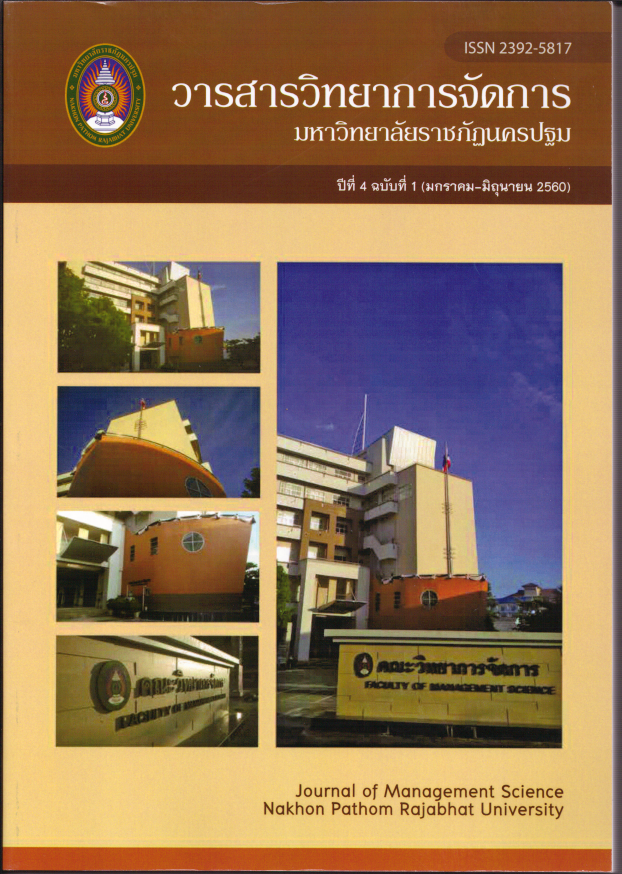Guidelines for development of routine to research motivation of university supporting staff in Nakhon Pathom Rajabhat University
Main Article Content
Abstract
The objectives of this research were to: 1) study the research facilitators and motivation for conducting research of supporting staff of Nakhon Pathom Rajabhat University; 2) compare motivation for conducting research of the university’s supporting staff as classified by personal factors; 3) analyze the research facilitators affecting motivation for conducting research of the university’s supporting staff; and 4) identify guidelines for developing routine to research motivation of the university’s supporting staff. The research sample was 127 university supporting staff of Nakhon Pathom Rajabhat University, derived by proportional stratified random sampling as distributed by department, and 5 interviewees derived by purposive sampling. The research instruments were a questionnaire and an interview form constructed by the researcher with IOC content between 0.67-1.00. The internal consistency reliability coefficients were 0.91-0.96 for research facilitators and 0.87-0.98 for conducting research motivation. Data were analyzed with percentage, mean, standard deviation, t-test, one-way analysis of variance, pair difference test, correlation coefficient, stepwise multiple regression and content analysis.
The findings of this research were as follows:
1. The research facilitators of supporting staff in Nakhon Pathom Rajabhat University was at a moderate level. These aspects were as follows: department support, research fund, and environment, material, equipment and facility. The motivation staff’s for conducting research was at a high level. The aspects of motivation factors were work achievement, responsibilities, and recognition; while the aspects of maintenance factors were job security, company policy and administration, and interpersonal relation with supervisors.
2. Overall, The supporting staff as classified by age, educational level, and work experience had different level of motivation for conducting research with statistical significance at .05. However, there was no difference among those as classified by gender, average income, and supervising department.
3. The research facilitators of supporting staff in the aspects of research fund (X2) and environment, material, equipment and facility (X3) together predicted motivation for conducting research of supporting staff at the percentage of 65 with statistical significance at .001. The regression equation was (Y'tot) =1.69+0.13X2+0.45X3.
4. Guidelines for developing routine to research motivation of supporting staff were as follows: 1) administrators’ support and involvement; 2) continuity of training for enhancing research knowledge and skills; 3) creation of research mindset; 4) provision of research clinic, research mentors, or research advisors; 5) arrangement of space or activities for successful researchers to share experiences in conducting good researches; 6) development of role model staff in conducting research and research networking; 7) encouragement of research for routine work development; 8) recognition, honor or giving reward to successful staff in conducting research; 9) provision of fund for conducting research, information about source of funding, including research dissemination fund; 10) establishment of working group for continuity supporting, monitoring, and evaluating feedback of university supporting staff’s research results.
Article history : Accepted 2 August 2017
SIMILARITY INDEX = 0.00
Article Details
The views and opinions of the article appearing in this journal are those of the author. It is not considered a view and responsibility of the editorial staff.
References
กรมส่งเสริมการเกษตร, กองวิจัยและพัฒนางานส่งเสริมการเกษตร. (2556). ถอดรหัสงานประจำนำสู่งานวิจัย. กรุงเทพฯ : กองวิจัยและพัฒนางานส่งเสริมการเกษตรกรมส่งเสริมการเกษตร.
โกมล บัวพรหม. (2553).แรงจูงใจในการปฏิบัติงานของครูโรงเรียนมัธยมศึกษา สังกัดสำนักงานเขตพื้นที่การศึกษาสุราษฎร์ธานี เขต3 ภาคนิพนธ์ครุศาสตร์มหาบัณฑิต.สาขาการบริหารการศึกษาบัณฑิตวิทยาลัย. มหาวิทยาลัยราชภัฏสุราษฎร์ธานี.
วิจารณ์ พานิช.(2553). การบริหารงานวิจัย แนวคิดจากประสบการณ์ (พิมพ์ครั้งที่ 4). กรุงเทพฯ : สำนักงานงานกองทุนสนับสนุนการวิจัย (สกว.).
ช่อลดา วิชัยพาณิชย์. (2554). ปัจจัยที่ส่งผลต่อการทำวิจัยของอาจารย์ มหาวิทยาลัยเทคโนโลยีราชมงคลธัญบุรี. วิทยานิพนธ์ศึกษาศาสตร์มหาบัณฑิต. สาขาวิชาเทคโนโลยีการวิจัยและการพัฒนาหลักสูตรบัณฑิตวิทยาลัย. มหาวิทยาลัยราชมงคลธัญบุรี.
ธนกฤต วัฒนากูล.(2551).ปัจจัยแรงจูงใจในการทำงานของพนักงาน บริษัท สายไฟฟ้าบางกอกเคเบิ้ล จำกัด จังหวัดสมุทรปราการ. การค้นคว้าแบบอิสระบริหารธุรกิจมหาบัณฑิต.สาขาวิชาบริหารธุรกิจบัณฑิตวิทยาลัย. มหาวิทยาลัยเชียงใหม่.
บุญชม ศรีสะอาด.(2556). การวิจัยเบื้องต้นฉบับปรับปรุงใหม่ (พิมพ์ครั้งที่ 9).กรุงเทพฯ: สุวีริยาสาส์น.
พัชรา บุญมานำ และสมควร ทรัพย์บำรุง.(2552). รายงานวิจัยเรื่องแรงจูงใจปัจจัยเกื้อหนุนและปัจจัยในการทำวิจัยของอาจารย์มหาวิทยาลัยธรรมศาสตร์.กองทุนวิจัยมหาวิทยาลัยธรรมศาสตร์ ประจำปีงบประมาณ 2551. ปทุมธานี : มหาวิทยาลัยธรรมศาสตร์.
มหาวิทยาลัยราชภัฏนครปฐม, กองการเจ้าหน้าที่และนิติกร.(2558).รายงานข้อมูลบุคลากรมหาวิยาลัยราชภัฏนครปฐม ปี 2558. กองการเจ้าหน้าที่และนิติกรมหาวิทยาลัยราชภัฏนครปฐม.
รุ่งนภา อินภูวา. (2551). การศึกษาแรงจูงใจในการทำวิจัยของบุคลากรมหาวิทยาลัยรามคำแหง. รายงานการวิจัย. สถาบันวิจัยและพัฒนา. มหาวิทยาลัยรามคำแหง.
วนิดา พิงสระน้อย.(2556). ปัจจัยที่มีอิทธิพลต่อการทำวิจัยของบุคลากรสายวิชาการ กลุ่มวิทยาศาสตร์สุขภาพ มหาวิทยาลัยธรรมศาสตร์. วิทยานิพนธ์ศึกษาศาสตร์มหาบัณฑิตสาขาวิชาเทคโนโลยี. การวิจัยและการพัฒนาหลักสูตร บัณฑิตวิทยาลัย. มหาวิทยาลัยราชมงคลธัญบุรี.
สมเจตน์ นาคเสวี และคณะ (2553). เจตคติต่อการวิจัยและปัจจัยที่เอื้อต่อการทำวิจัยของบุคลากรวิทยาลัยอิสลามศึกษาศึกษามหาวิทยาลัยสงขลานครินทร์ วิทยาเขตปัตตานี. วารสารสงขลานครินทร์ ฉบับสังคมศาสตร์และมนุษยศาสตร์, 16 (3): 514-532.
สิริรัตน์ หิตะโกวิท. (2551). ปัจจัยของความสำเร็จในการทำวิจัยของบุคลากรในมหาวิทยาลัยรามคำแหง.วิทยานิพนธ์ศึกษาศาสตร์มหาบัณฑิต. สาขาวิชาการบริหารการศึกษา. บัณฑิตวิทยาลัยมหาวิทยาลัยรามคำแหง.
สุพานี สฤษฎ์วานิช. (2552). พฤติกรรมองค์การสมัยใหม่ :แนวคิดและทฤษฎี. (พิมพ์ครังที่ 7). กรุงเทพฯ: โรงพิมพ์มหาวิทยาลัยธรรมศาสตร์.
สุวรรณ พรมเขต. (2556). ปัจจัยที่มีผลต่อแรงจูงใจในการทำวิจัยของอาจารย์มหาวิทยาลัยเทคโนโลยีราชมงคลศรีวิชัย. สถาบันวิจัยและพัฒนา มหาวิทยาลัยเทคโนโลยีราชมงคลศรีวิชัย, วารสารสาระคาม 4, (2): 33-34.
สุวิมล ติรกานันท์.(2557). การสร้างเครื่องมือวัดตัวแปรในการวิจัยทางสังคมศาสตร์แนวทางสู่การปฏิบัติ. กรุงเทพฯ : สำนักพิมพ์แห่งจุฬาลงกรณ์มหาวิทยาลัย.
Jacobs, R. L. & McClelland, D. C. (1994). Moving up the corporate ladder: A longitudinal study of the leadership motivation pattern and managerial success in women and men. Consulting Psychology Journal: Practice and Research, 46 (1), 32-41.
Herzberg. F. (1975). The motivation to work (2nd ed.). NY : Johns Wiley & Sons.


